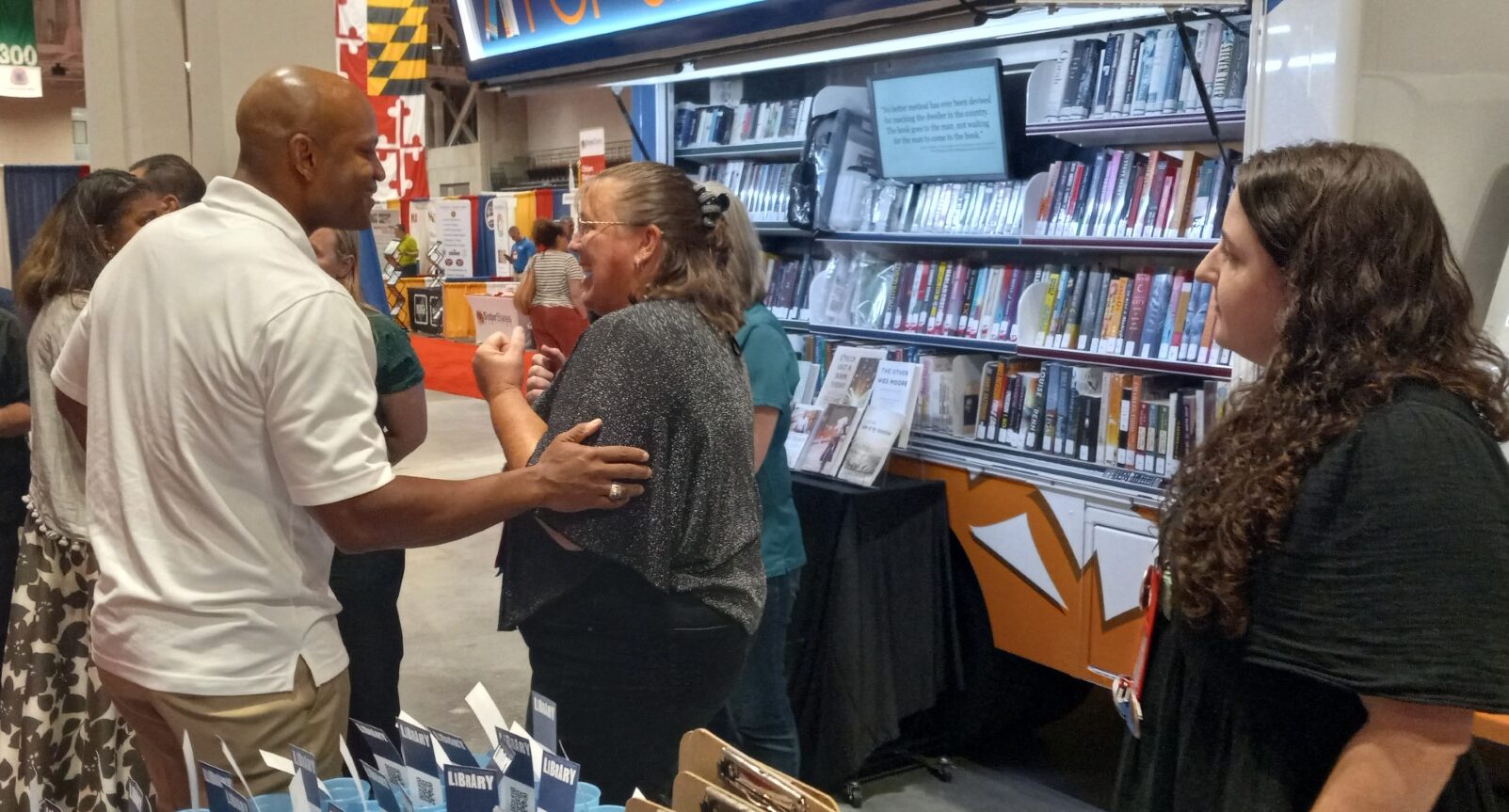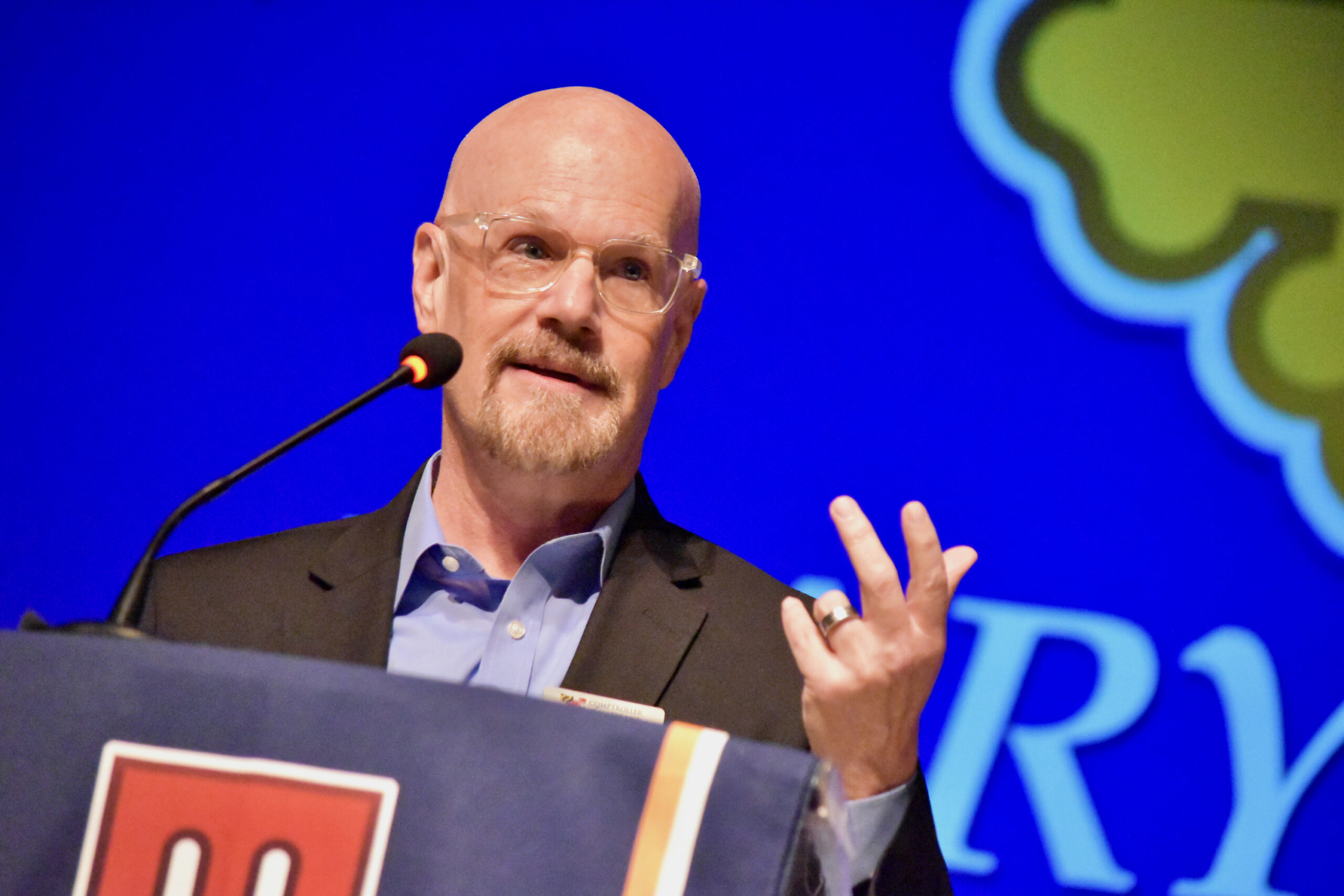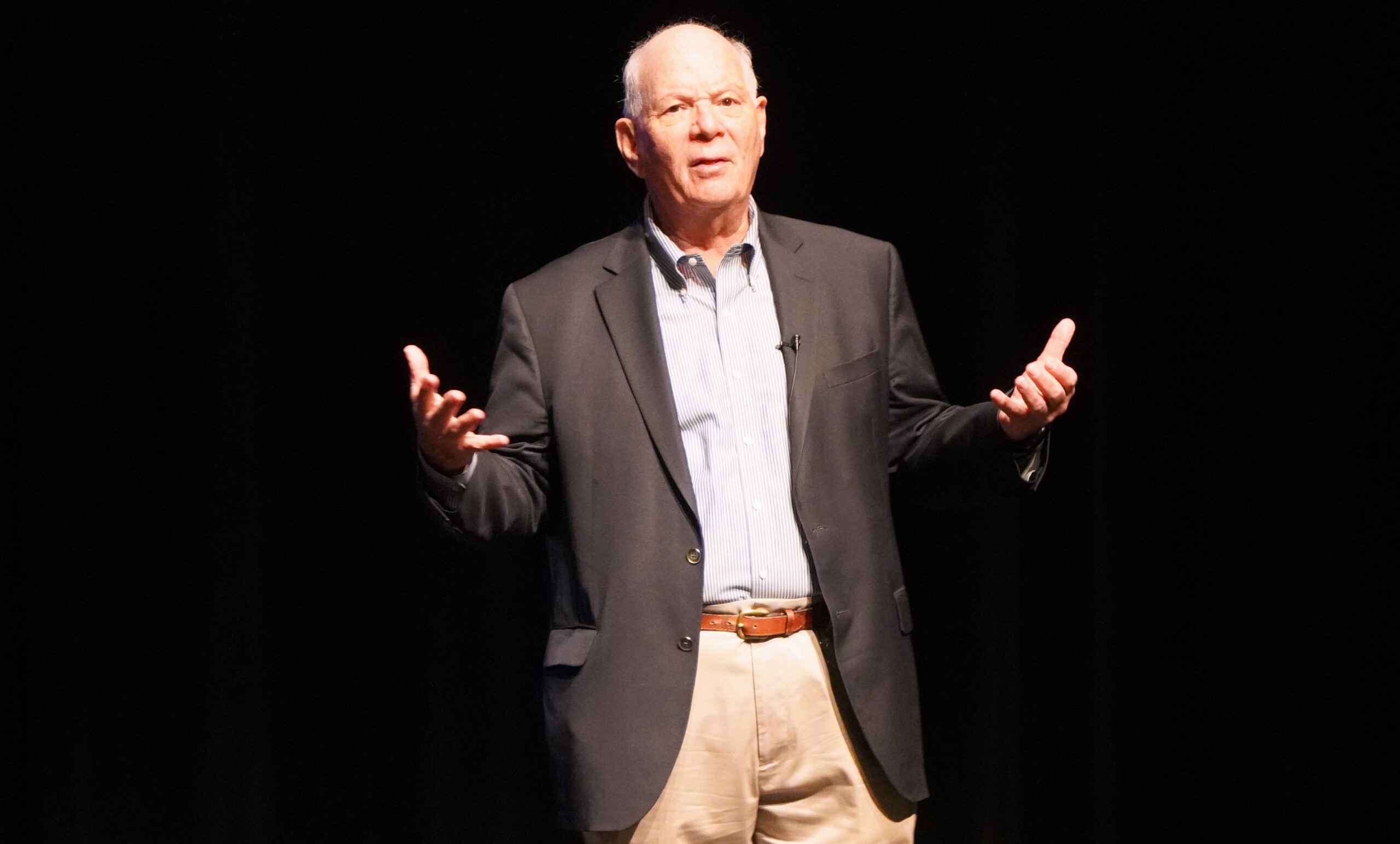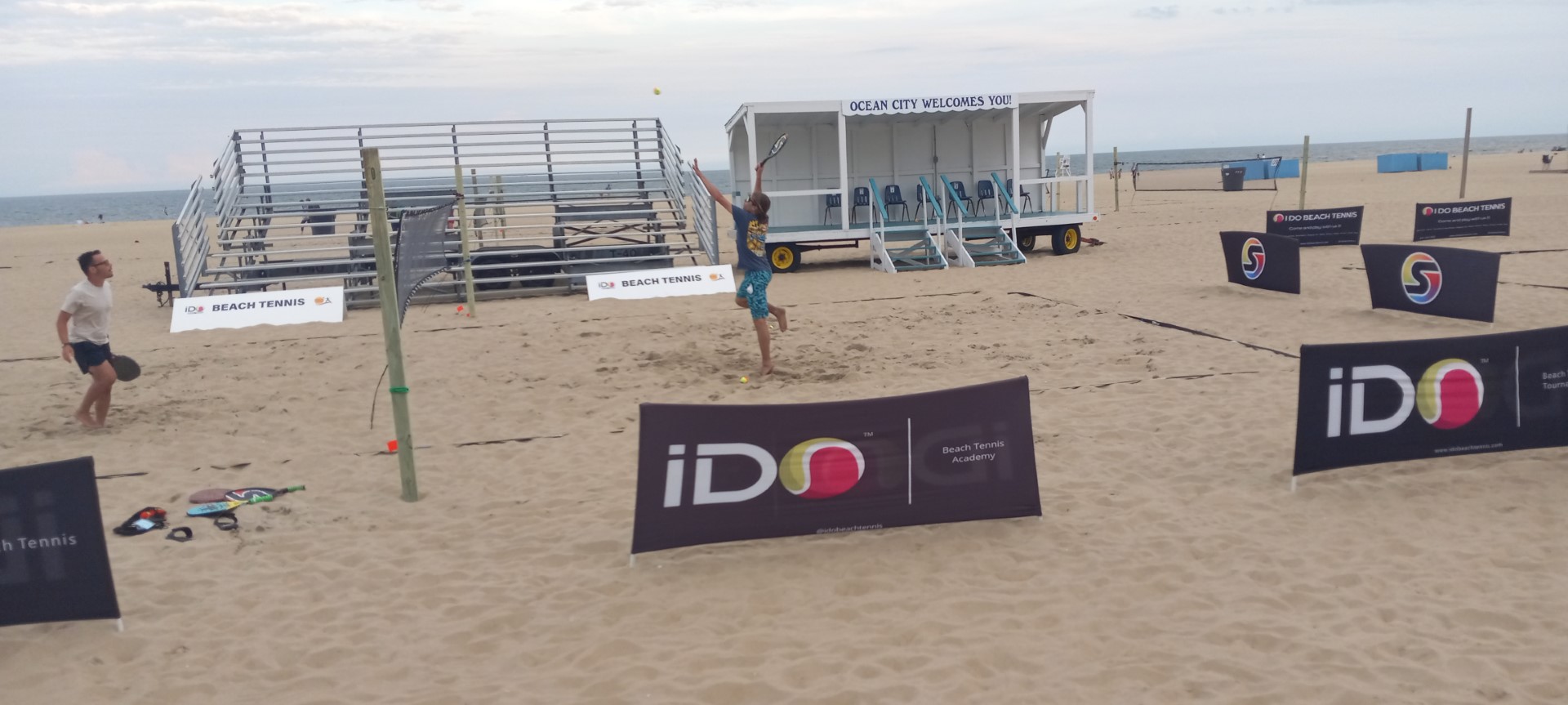
After many years in public office, Prince George’s County Executive Angela Alsobrooks (D) is three months into her first statewide campaign, as she competes in the May 14 Democratic primary for U.S. Senate. How has the transition to statewide campaigning met with her expectations?
“It is more work, as it should be,” Alsobrooks said during an interview at the Maryland Association of Counties conference in Ocean City on Friday. “I approached all of this knowing it was going to be really hard and feeling it should be really hard. Because it’s an honor to do this.”
Here’s one thing Alsobrooks is doing in this campaign that she’s never done before in her life — and she’s doing it at the suggestion of Vice President Kamala Harris, a political mentor.
“For the first time in my life, I’m keeping a journal,” Alsobrooks said. “And this is the advice I got from the vice president. When I asked her, ‘What do you wish you had done more of?’ she said, ‘I wish I had kept a journal, just to savor the moment.’ So I’ve been able to document the beautiful experiences I’ve had with people all over the state. And I have to tell you, I’ve been so encouraged by how I’ve been received all over the state.
“I have found that people all across the state — they’re so warm. And I have found that we want the same things. And I think it’s affirmed what I’ve always thought: If you talk about what families care about, there’s some part of each of our stories that resonate with each other.”
Many political leaders through history have been diarists. Sometimes they keep a journal because they imagine publishing a memoir at some point in their lives. And often enough, their journals make for very interesting reading, if they’re published. Alsobrooks does not appear to have any literary ambitions, for now.
“It is a slog,” she said of the campaign. “I think come May I’m going to wonder how I did it. But when you’re in the moment you just have to do it.”
Alsobrooks conceded she sometimes wonders if she’s gone “crazy.”
“I’m a mother, I’m the county executive and now this crazy lady has gone and is running for U.S. Senate,” she said. “But you know what? Being a mother is the single best preparation for any of this, because you have to juggle so many things.”
Including finding the time to jot it all down.
Value added
Gov. Wes Moore (D), as well as we could tell, spent about two hours Friday in the Exhibition Hall of the Roland E. Powell Convention Center, visiting dozens of the vendors peddling their wares to all the government officials who were on-hand for the MACo conference.

Gov. Wes Moore (D) greets librarians from the Worcester County Pop-Up Library at the Maryland Association of Counties conference. Photo by Josh Kurtz.
As might be expected, Moore spent a good chunk of his time visiting the booths belonging to several state agencies, now that he’s running the government.
But we were struck by his visit to the Worcester County Pop-Up Library, a mobile library attached to a pickup truck that wheeled into the cavernous convention center, carrying dozens of books.
Many vendors in the Exhibition Hall give away prizes during MACo; conference attendees drop their business cards into a jar and prize winners are selected later.
At the pop-up library, the prizes were copies of three of Moore’s books, including his best-seller, “The Other Wes Moore.” The governor seemed genuinely touched by the gesture and hugged the beaming librarians. Then he signed the books — increasing their value for the lucky winners.
Nod nod, wink wink, say no more
Adult recreational use of marijuana is legal in Maryland, but that does not come without challenges.
The state law that took effect July 1 levies a 9% sales tax on recreational sales (sales to verified medical patients are tax-free).
“We have had some high revenue reports [from licensees] over $200,000, $117,000, $180,000 in tax just for the month of July,” said Rob Scheerer, director of the Office of the Comptroller’s Revenue Administration Division. “I won’t name who those players are, but those dollars are in the door already. And as I said, the lion’s share of this revenue is really going to come in late October.”

Rob Scheerer, director of the Office of the Comptroller’s Revenue Administration Division. Photo by Bryan P. Sears.
With hundreds of thousands of dollars already pouring into state coffers, the trick was getting that money into an actual bank. Cannabis remains illegal at the federal level. Most banks will not touch the money fearing federal regulators.
“It was a big deal,” said Scheerer. “This was a heavy lift and something that we had to do. In order to protect the banks, we can’t even call this cannabis on the tax return.”
Maryland’s bank is Wells Fargo. Negotiations with the bank resulted in a unique tax smokescreen.
“We have craftily called this ‘A sale subject to the 9% rate under Senate Bill 516 of 2023,’” said Scheerer.
Autonomous driving freaks Ben Cardin out
As he does most years, U.S. Sen. Ben Cardin (D-Md.) hosted a town hall at MACo Friday to hear the top concerns from county officials and community organizers and discuss how Maryland’s congressional delegation is tackling various problems.
The questions ranged from potential climate change regulations, to how to provide more affordable housing, to whether Maryland will be the new location for the FBI headquarters.
But the topic of the developing technologies surrounding artificial intelligence programs emerged as a key theme. And Cardin said that it is one of his highest priorities to develop legislation surrounding AI.

U.S. Sen. Ben Cardin (D-Md.) answering questions at his MACo town hall event Friday. Photo by Danielle J. Brown.
“We have gone to school in the United States Senate on AI. We have classes every week trying to understand the challenges that we have,” he said. “We know AI has been with us for a long time — but it is a challenge to our elections security. It’s a challenge to our national security. It’s a challenge to privacy. And we also know that it is a valuable tool to our economic growth.”
Cardin said that senators are looking into how to place the “proper guardrails” on AI technology.
Del. Chao Wu (D-Howard) asked Cardin about the discussions surrounding AI programs that inform autonomous driving and what federal regulations on that might look like.
“It’s a very interesting subject because…the statistics would lead you to the conclusion that we should be using it. Why? Because the error rate, particularly in parking the car using AI technology for automatic driving, is a lot safer than a person driving into a parking space,” Cardin answered.
“But it freaks me out,” he continued, “to think that we have AI drivers out there.” There were laughs in the auditorium, seemingly in agreement.
“So we have to regulate this. And the committees are looking at what are the proper ways,” he said.
Term-limit talk
Montgomery County officials attending the MACo conference have largely been obsessing over the scandal engulfing the county’s public schools — specifically, a longtime principal has been accused of sexual harassment, bullying and retaliation.
But a second topic of conversation is a Republican attempt to limit Montgomery County executives to two terms. A group spearheaded by Reardon Sullivan, the GOP nominee against County Executive Marc Elrich (D) last year, is collecting petition signatures to put an initiative on the 2024 ballot that would force Elrich to leave office when his second term ends in 2026. Elrich, age 73, has yet to say whether he will seek a third term.

Anne Arundel County Executive Steuart Pittman reads Montgomery County Executive Marc Elrich’s T-shirt at a reception in Ocean City this week. The shirt reads: ‘Science is not a liberal conspiracy.’ Submitted photo.
“The current County Executive Marc Elrich is destroying our County,” the group that’s organizing the petition drive, Committee for Better Government, says on its website. “He has defunded the police, stood by while our public education system erodes, and allowed the economy in Montgomery County to falter while Northern Virginia continues to grow their economic base.”
Proponents of the measure need to collect 10,000 valid signatures to get their initiative on the ballot. To Democrats’ chagrin, Republicans have been spending the week collecting signatures at the Montgomery County Agricultural Fair in Gaithersburg, which ends Saturday — while the county Democratic Central Committee, despite Democrats’ dominance in MoCo, chose not to have a presence at the popular fair.
Robin Ficker, the Montgomery County provocateur and frequent Republican candidate, got a ballot measure passed overwhelmingly in 2016 that limited county executives and councilmembers to three terms. He is not directly involved in the new term limit push at this point, as he wages a long-shot campaign for U.S. Senate.
In a conversation with reporters this week, Elrich called the measure “undemocratic.”
“I don’t believe in term limits, anyway,” he said. “The voters voted to put in term limits at three. I never pressed to go above that number. I was at peace with that decision voters made before they ever elected me as county executive.”
Elrich said a two-term limit might be the only way the GOP could take him out.
“I think it’s bad for politics,” he said. “I wouldn’t do this to a Republican. If the voters want to elect somebody, they should be able to elect who they want. And if the primary doesn’t sort it out then you sort it out in the general. But taking away voters’ choices by doing this is I think is fundamentally undemocratic.”
Montgomery County Council President Evan Glass (D) also described the term limit effort as “undemocratic” — though for slightly different reasons. He suggested that needing 10,000 signatures to get a measure on the ballot in a county of more than 1.1 million residents was “ridiculously low.”
It should be pointed out, however, that a forced departure for Elrich would guarantee that his plum position comes open in 2026, rather than the potential that he could serve to the end of 2030. So a two-term limit could be good for all the Democrats imagining they might be able to replace him.
Tennis, anyone?

Two beach tennis players practicing near the Ocean City boardwalk Thursday evening ahead of a three-day tournament that began Friday. Photo by Josh Kurtz.
In his capacity as counsel to the Clean Chesapeake Coalition, which consists of Upper Shore governments and other stakeholders, attorney Chip MacLeod is a fixture at MACo, delivering an update of the group’s activities and priorities during its annual meeting at the conference.
But this week, MacLeod had another reason to be in Ocean City: He helped organize the resort town’s first commercial beach tennis tournament.
Beach tennis is exactly what it sounds like: Tennis played on the beach. But, according to MacLeod, its popularity boomed during the pandemic, because at the time “no one could do anything but go to the beach.” The number of players worldwide increased from about 350,000 pre-2020, MacLeod said, to about 3.5 million today. That’s when he became a fanatic.
The tournament in Ocean City, on 12 courts just off the boardwalk near 2nd Street, started Friday and continues all weekend. It features both professionals — yes, there are beach tennis professionals — and amateurs. Most matches are doubles, because there’s so much ground to cover on the beach court, MacLeod explained, but some can just feature single opponents.
“I was so psyched it was coinciding with MACo, I thought, ‘s***,’ I’m going to bring all the county people to see it,” he said. “It’s a little diversion.”